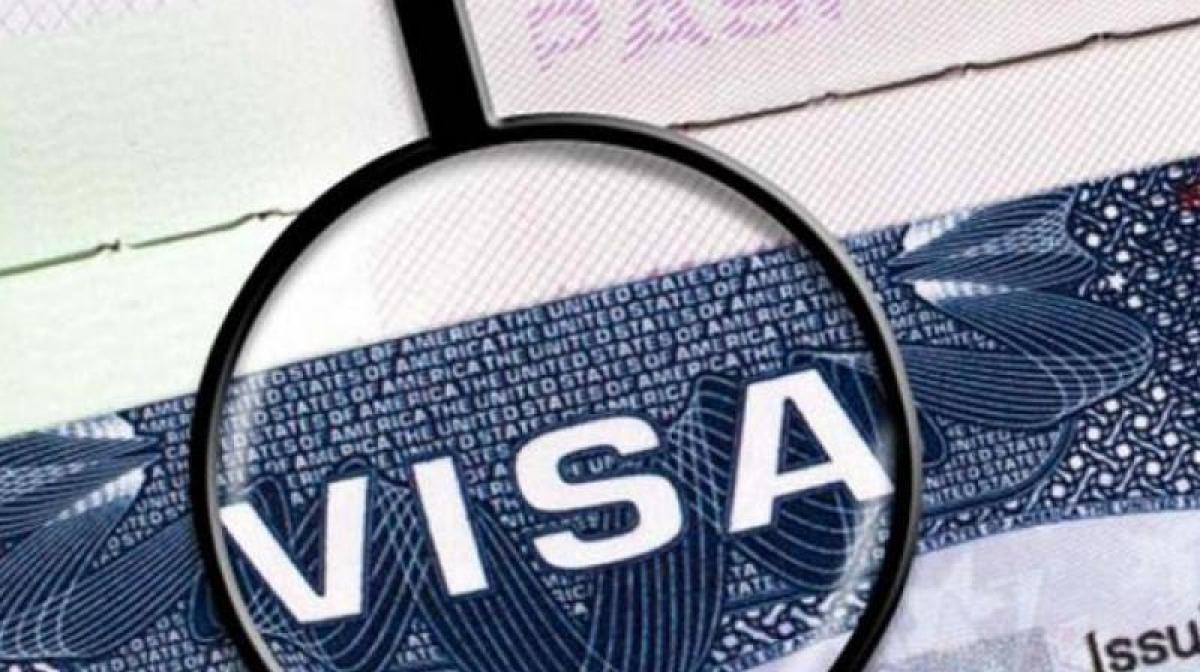Live
- NASA Tracks Five Giant Asteroids on Close Approach to Earth Today
- Pushpa 2 Hits ₹1000 Crore in 6 Days: How It Compares to Other Top Indian Films
- Vivo X200 and X200 Pro Launched in India: Price, Specifications, and Features
- Nitin Gadkari Admits Feeling Embarrassed at Global Summits Over Rising Road Accidents in India
- Comprehensive Review on Indiramma Housing Survey and Welfare Initiatives Conducted via Video Conference
- Jogulamba Temple Records Rs 1.06 Crore Hundi Revenue in 150 Days
- Opposition Slams ‘One Nation, One Election’ Bill as Anti-Democratic; BJP Allies Support the Move
- Celebrate Karthigai Maha Deepam Virtually with Sri Mandir’s LIVE Darshan Experience
- BJP Extends Support to Samagra Shiksha Abhiyan Employees' Strike, Demands Immediate Regularization and Welfare Benefits
- Dr. M. Priyanka Stresses Quality Education, Nutritious Meals, and Cleanliness in Schools
Just In

The US Department of State has proposed tougher questioning of visa applicants who it believes warrant extra scrutiny, according to a government document published Thursday, in a push toward the \"extreme vetting\" sought by President Donald Trump.
The US Department of State has proposed tougher questioning of visa applicants who it believes warrant extra scrutiny, according to a government document published Thursday, in a push toward the "extreme vetting" sought by President Donald Trump.
The additional criteria would include questions about social media accounts and apply to 65,000 people per year or about 0.5 percent of visa applicants worldwide, the State Department estimated, though it did not target nationals of certain countries.
A set of new questions would apply to visa applicants "who have been determined to warrant additional scrutiny in connection with terrorism or other national security-related visa ineligibilities," the State Department said in a notice to the Federal Register.
Those applicants would be required to give all prior passport numbers, five years' worth of social media handles, email addresses and phone numbers as well as 15 years of biographical information when applying for a US visa. Consular officers will not request user passwords for social media accounts, the document said.
If granted, the new criteria would mark the first concrete step toward more stringent vetting Trump asked federal agencies to apply toward travelers from countries he deemed a threat to the United States in an executive order issued in January and again in March.
While parts of the travel order, including a temporary ban on travel from several majority-Muslim countries, were halted by federal courts, the review of vetting procedures detailed in an accompanying memorandum remains in place.
A State Department official said: "Collecting additional information from visa applicants whose circumstances suggest a need for further scrutiny will strengthen our process for vetting these applicants and confirming their identity."
The State Department's proposal adds that applicants may be asked to provide additional travel dates if a consular officer determines they have been in an area which was "under the operational control of a terrorist organization."
The proposed changes must undergo a public comment period before being approved or denied by the Office of Management and Budget (OMB) by May 18.
Social Media Snags
Immigration lawyers and advocates say the request for 15 years of detailed biographical information, as well as the expectation that applicants remember all their social media handles, is likely to catch visa applicants who make innocent mistakes or do not remember all the information requested.
They also question whether the time-consuming screening can achieve its intended goal of identifying potential terrorists.
"The more effective tactics are the methods that we currently use to monitor terrorist organizations, not just stumbling into the terrorist who is dumb enough to post on his Facebook page 'I am going to blow up something in the United States,'" said John Sandweg, a former senior official at the Department of Homeland Security, or DHS.
Because reviewing social media information is so labor intensive, several pilot programs have experimented with automation. But a DHS inspector general report concluded in February that the technology has so far proven flawed and required humans to ensure accuracy, leaving most of the checks to be done manually.
Applicants may not necessarily be denied a visa if they fail to provide all the information if it is determined they can provide a "credible explanation", the notice said.
Secretary of State Rex Tillerson first introduced similar measures in a March cable to American consular officers that outlined questions officers should now ask in order to tighten vetting of US visa applicants.
But Tillerson had to withdraw that guidance in a cable just days later, writing to officers worldwide that the OMB had not approved those specific questions.
The State Department estimated that the additional screening measures would take approximately an hour per applicant, meaning an additional 65,000 additional hours of work per year.
Tillerson's cables anticipated delays as a result of their implementation.
"Somebody's got to do the work," said Greg Siskind, an immigration attorney in Memphis. "It's going to cause operations at a lot of consulates slow to a crawl."

© 2024 Hyderabad Media House Limited/The Hans India. All rights reserved. Powered by hocalwire.com







